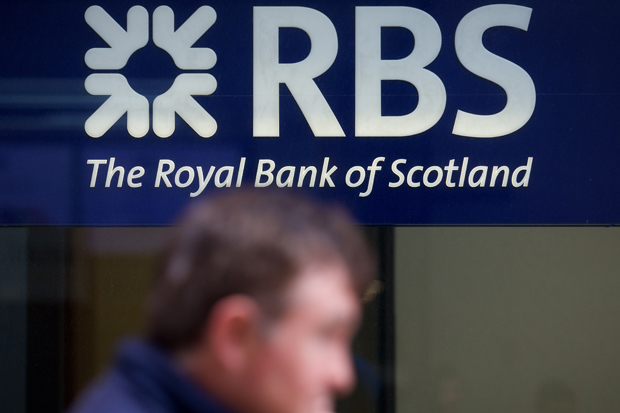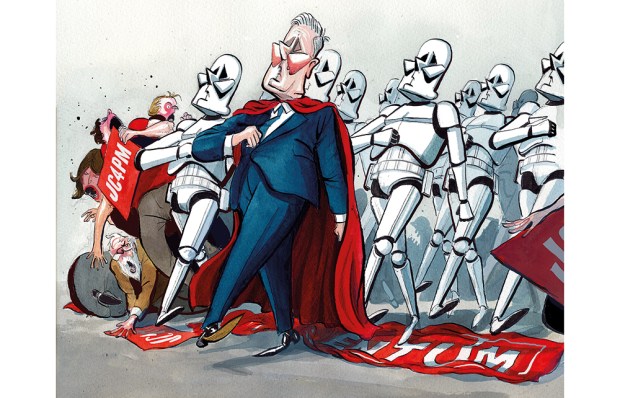Should anyone take investment advice from Royal Bank of Scotland, the institution which so misread markets before the crash that it required the biggest taxpayer bailout in banking history? Possibly not, but a bulletin from RBS’s research team this week certainly caused a stir by declaring that ‘in a crowded hall, exit doors are small, risks are high’, ‘sell mostly everything… except high-quality bonds’; and finally, ‘for the world: the game is up’.
Strong stuff, indeed — and written in such staccato City language that it reads like the last scribbled testament of a passenger in a crashing plane. Behind it is the view that assets boosted by quantitative easing can now only go down, that China is in even deeper trouble than first appeared, that the build-up of global debt is even more dangerous, and the share and oil-price falls of recent weeks are merely a harbinger of worse market turmoil to come.
RBS’s scribblers are not the only ones who think ‘this all looks similar to 2008’: George Soros, always worth heeding, has said something similar, and come to think of it, even this column has warned more than once of ‘the writhing python of doom’ lurking over our heads. We should certainly brace ourselves — but should we really stampede for the exit? I’d call that wild headline-grabbing rather than wise advice, from a bank with a peerless record of irresponsibility.
Bolland has had enough
It must be decades since I bought underwear at Marks & Spencer, for myself or anyone else. I’d shop anywhere for a two-for-one on button-front Jockeys; I was thrilled to get ten pairs of socks for £9.99 as an add-on to the £165 suit I bought from a Spectator ad; and the next time I send an anonymous gift of lingerie to (let’s say) Fiona Bruce, I’ll pick a little number online from Bella di Notte, which happens to be one of our local Yorkshire success stories.
I’m no fashionista, but I’m your typically promiscuous, bargain-hunting modern consumer. Except in one respect: I’ll drive past any motorway service station that does not have an M&S food outlet, because that’s where I like to buy my car picnics. And there, I think, is everything you need to know about the fate of what was once Britain’s most admired chain store, and why its 56-year-old chief executive Marc Bolland is ‘retiring’ early. M&S today is a great food retailer — confirmed by its 0.4 per cent like-for-like increase in pre-Christmas food sales, in a market in which even Waitrose reported a minus — with an outmoded clothing and ‘general merchandise’ business attached.
Bolland is a marketing whiz who previously worked for Heineken and Morrisons; he modernised M&S’s systems and kept the food offering ahead of its rivals. But analysts rarely asked him about any of that: they were obsessed with the stores’ clothing offer, especially womenswear, a sector in which M&S has lost almost half its market share over the past 20 years and reported a 5.8 per cent fall in the pre-Christmas quarter.
No wonder Dutch-born Bolland — who will now have the pick of top retail and consumer brands jobs across Europe — has had enough. But on my principle that there are generally too few internal promotions at the top of British business, I’m glad to see ‘M&S lifer’ Steve Rowe picked to succeed him. Not surprisingly, Rowe made his name on the food side of the business.
Blaming the weather
Retail is the big theme of the week as all the major high-street names reveal their pre-Christmas trading results. Tesco will be one of the last to declare; among the surprises so far is Morrisons, with a 0.2 per cent sales increase when analysts were predicting a downturn. Next — whose shares have been the darling of the sector lately — blamed climate change, or at least an unseasonally mild December, for weak clothing sales. Likewise Sports Direct, the troubled fiefdom of billionaire Mike Ashley, gave weather as a reason for a profits warning that provoked yet another plunge in its share price. Poundland wasn’t so meteorological, but probably blames rising prosperity for falling customer numbers: consumers are less tempted by dirt-cheap offers than they used to be — though as the FT pointed out, they might soon be able to buy a Poundland share for £1, down from £3 at flotation in 2014.
Retail has always been about detail, but it used to be a simpler matter of value for money and brand reliability. Now it’s a kaleidoscope of squeezed suppliers, stock-control gizmos, online slickness, click-and-collect, social media, celebrity endorsement and smart discounting. What it’s not about is ‘I always buy my pants at M&S because that’s where Margaret Thatcher bought hers.’ That loyalty is dead, in every possible way.
Going downmarket
I’ve always thought Argos was a bit of a dog. I don’t mean Argos the faithful old hound who recognised Odysseus on his return to Ithaca, then quietly expired. I’ve always been so touched by that story that I would have named my own dog Argos if it wasn’t for the association with the downmarket catalogue retailer, now (with Homebase and Habitat) part of the Home Retail group. But Sainsbury has decided to bid £1 billion for Home Retail, just to get its hands on Argos, and may have to increase its offer substantially to win. Sainsbury is self-consciously middle-class these days; Argos definitely isn’t. But Argos evidently has a world-class order and delivery system — to rival Amazon’s, even — which the supermarket chain lacks, and there’s scope to re-site some of Argos’s outlets inside Sainsbury’s 1,350 stores.
So maybe the bid is a good idea even if several City rent-a-quotes beg to differ. What it certainly tells us is that retail in all its forms today is about competitive technology in an overcrowded space — and no longer, to adapt a venerable Sainsbury slogan, just about good food that costs less. As for Argos, maybe there’s life in the old dog yet.
Got something to add? Join the discussion and comment below.
Get 10 issues for just $10
Subscribe to The Spectator Australia today for the next 10 magazine issues, plus full online access, for just $10.
You might disagree with half of it, but you’ll enjoy reading all of it. Try your first month for free, then just $2 a week for the remainder of your first year.















Comments
Don't miss out
Join the conversation with other Spectator Australia readers. Subscribe to leave a comment.
SUBSCRIBEAlready a subscriber? Log in